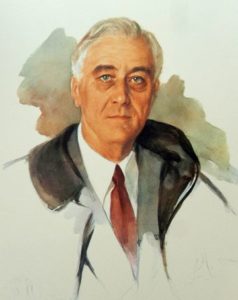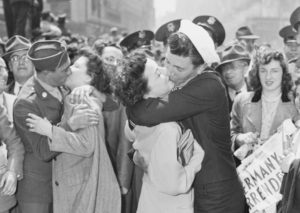The year 2020 marks a number of 75th year anniversaries in WWII history, both on the front lines of the war and on the home front. While the war tested every American wherever they were, doing whatever they were doing, the last year of the war was a rebirth of the country (and the world). The difference between American pre-WWII and post-WWII is dramatic.
The year rapidly changed the American way of life.
Early in 1945, the US and the Allies were in Germany with the success of the Battle of the Bulge. Troops began witnessing first-hand the disturbing atrocities of life under German Nazi rule. Concentration camps were liberated after the shock of their discovery. One after another camps were discovered starting with Auschwitz on January 27, 1945. News of the camps arrived to the home front slowly. It wasn’t until August, 1945 when secretly taken photos of Auschwitz provided scenes of the camps did it really set in at home about what hell on Earth looked like.
For the most part, Associated Press and Life Magazine reporters provided ample stories and pictorial testaments of the war, but slanted in a way to protect the country’s moral and keep the patriotic spirit strong. Propaganda.
Other photos arriving home in the first few months of 1945 were signaling the end of the war in very graphic detail. On February 13th – 15th US and British air raids on Dresden, Germany obliterated the town, killing approximately 25,000 people. 949 bombers were involved in the attack and 3.9 tons of bombs were dropped to create a firestorm of destruction. I’ll never sew another Dresden Plate quilt block without thinking of the town it was named after in pre-war 1930s.
Battles in the Pacific Theater were fought hard and long. The Battle of Iwo Jima produced one of the most iconic photos of all time (Raising the Flag on Iwo Jima) but it took from January 3rd until March 26th to earn the victory. In that time 18,000 Japanese and 6,000 Americans lost their lives.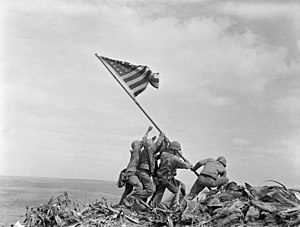
President Franklin Delano Roosevelt, our 32nd President and only President to serve four terms was sworn in for the final time on January 20th at the White House, not the Capitol with a very brief speech and without a fanfare parade. Sadly, he died only a few short months later on April 12th. A nation mourned for a President that had led them through the Great Depression and a war that was close to finally ending. Many Americans in the minority classes mourned for the hope of a future under their beloved FDR.
May 8th marked VE Day, Victory in Europe. What an incredible day! The entire world celebrated together with impromptu parades, dancing and cheering in the streets — and with uh…well…sex. The Boomers Generation officially started. Do you know any 74-year-olds who will be celebrating their 75th birthday in early to mid-February of 2021?
The birth rate in 1946 jumped 20% from the previous year to a whopping 3.8 million. We won’t credit all of the stork flights on the celebrating; many had put off having children during the Great Depression and saw the promise of best times ahead and a good reason to get going.
The celebrating in May was a bit short-lived when the reality of the second front in Japan was remembered. Instead of taking the first boat home, sons and husbands were on the first boat to the Pacific. Here’s where debate of what would have happened if history did not play out exactly the way it did heats up.
The Manhattan Project was nearing a working solution to end the war — The Atomic Bomb. A famous flight by the Enola Gay bomber over the Japanese city of Hiroshima created another iconic photo of history. The huge mushroom cloud rising into the sky was the visual effect of 80,000 instant civilian deaths (tens of thousands more in the following weeks from radiation exposure). Three days later a second bomber was sent with the same outcome over the city of Nagasaki, resulting in another 40,000 lives taken.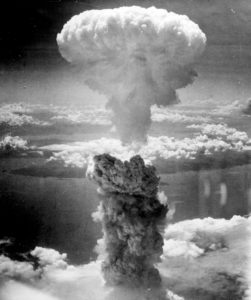
Would President Roosevelt have ordered the detonation of the bombs had he been alive? The opinions of the time were harsh. Many Americans justified the bombing with the realization that war in Japan would have cost many, many more lives on all sides — American, Allies, Japanese, and civilians. The race for the a-bomb was incredibly close. Upon takeover of German labs, Allies found that they were hot on the Americans’ heels of solving the formula. The formula, by the way, was shared later on in 1945 with only Britain and Canada.
VJ Day or Victory in Japan day was finally celebrated on August 14th. More babies!
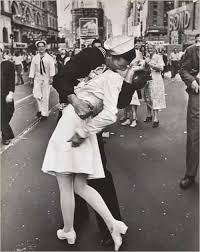
Between May and October 1945 over three million US Soldiers, Marines, Airmen, and Sailors returned home. One million returned home in December alone. Shout out the September 2021 septuagenarians!
Many more had not reached their points needed for discharge from the service and had to spend a few more months stateside on bases all over the US before returning to their civilian lives full-time.
The GI bill and other veteran programs made a good life possible, if they could leave the scars of war behind them. What they saw and experienced overseas has had a lasting effect on every American life still to this day, in bad and good ways. Many of the common foods we now enjoy regularly were novel ideas to the greater population. Take note of how many restaurants and hometown businesses proclaim “Since 1945 or Family-Owned & Operated Since 1946”. Especially pizzerias. Many returning from Italy could not imagine a life without the taste of the food they tasted from a wood-burning pizza oven during the war.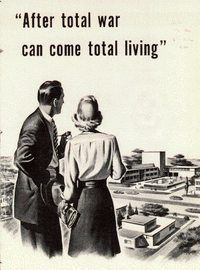
Our country learned a lot about plastics, laboratory food and preservatives, medical trauma advances, rapid production, women’s abilities (oops…better to tuck them back in the kitchen even if they didn’t want to work there anymore), and human resiliency towards a dream being home in the good ol’ USA.
The ultimate sacrifices made by those that did not come home left their mark. With all the celebrating and happiness can deep grief felt by the parents, siblings, widows, and children of those not getting their homecoming reunion. Not in 1945, not ever. 420,000 American lives were taken by the war.
Rationing ended. First, on August 15th, 1945 with gasoline and fuel rationing ending. Then, October 30th, 1945 with shoe rationing ending followed by November 23rd, 1945 with most food rationing including meat and butter coming to an end. On December 20, 1945 tire rationing ended and sugar rationing ended a little later on in 1946. The scars of rationing include hoarding behaviors and attics full of boxes of random materials that could be used over again — anyone else have grandmothers holding onto a lifetime supply of bread bag twist-ties, snagged pantyhose, glass jars, or clean nice-sized cardboard boxes?
Over the next twelve months, we may hear of other septua-anniversaries and note-worthies. Here are just a few:
February Date Unknown: Anne Frank dies from typhus along with her sister Margot. They were spared immediate death in the Auschwitz gas chambers and instead were sent to Bergen-Belsen, a concentration camp in northern Germany. Their bodies were thrown into a mass grave.
February 9th: WAAF (Women’s Auxiliary Air Force with the Royal Air Force) Margaret Ida Horton, a Fitter Mechanic Airframes took a flight clinging to the tail of a British Spitfire when the pilot forgets that she was adjusting the plane before take-off. She successfully landed back on the ground after the pilot realized that his plane was not handling correctly.
February 10th: Rum & Coca-Cola is released by The Andrews Sisters. It is one of the most recognized and loved songs of the WWII Big Band Era.
March 4th: Princess Elizabeth (who becomes Queen Elizabeth II seven years later) joins the British Auxiliary Transport Services as a driver. 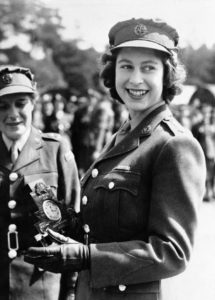
March 6th: The trampoline is invented by George Nissen.
March 8th: The first International Women’s Day observed.
March 8th: Phyllis M. Daley becomes the first African American nurse sworn in as US Navy ensign.
March 12th: New York is the first state to prohibit discrimination by race and creed in employment.
April 18th: Well-known war correspondent Ernie Pyle was killed by enemy fire on the island of Ie Shima, Okinawa, Japan. After his death, President Truman spoke of how Pyle “told the story of the American fighting man as the American fighting men wanted it told.”
April 30th: Adolph Hitler and Eva Braun commit suicide (or did they…?).
May 1st: Joseph Goebbels (Hitler’s successor) and wife commit suicide after killing all six of their children.
July 6th: Abbot and Costello’s ‘Who’s on First’ routine is aired.
July 28th: US Army B-25 crashes into the 79th floor of the Empire State Building due to fog. Fourteen people die. Elevator Girl Betty Lou Oliver survives a 75-story fall in the elevator she was operating at the time.
July 29th: USS Indianapolis sunk by Japanese forces. Only 316 survive after being pulled three days later from shark-infested waters. 833 lost souls. Amazingly, this is the ship that delivered components of the A-Bomb to US forces in Japan. They were on their return journey. What would the world be like now had the Japanese taken out the ship on their way to the drop off point?
August 21st: President Truman ends the Lend-Lease Program which was created by President Roosevelt to provide for military aid to any country whose defense was vital to the security of the United States. The plan thus gave Roosevelt the power to lend arms to Britain with the understanding that, after the war, America would be paid back in kind.
September 9th: First computer program bug is discovered by Grace Hopper. She used a tweezers to remove a moth that she found inside a rare massive computer being used by the government.
September 9th: The first successful kidney dialysis takes place in The Netherlands.
September 15th: Hurricane Homestead hits southern Florida inflicting $60M in damages ($900M in 2020 dollars).
September 19th: School integration spurs a walk out in Gary, IN.
October 3rd: Elvis Presley makes his first public appearance at age 10.
October 5th: Meet the Press airs for the first time on radio.
October 21st: Women in France are allowed to vote for the first time.
October 29th: First ballpoint pen goes on sale. It is created by the Biro company.
December 5th: US Navy Flight 19, a squadron of five bombers with 14 crewmembers report problems with navigational systems over the waters near Bermuda and completely disappear. Rescue flight PBM-5 and its crew disappeared in its attempt to find any sign of the missing. This began the mystery of The Bermuda Triangle.
December 21st: General Patton dies from complications of a broken neck sustained during a car crash near Manheim, Germany twelve days earlier. In 1947, his memoir, War as I Knew It, was published posthumously.

